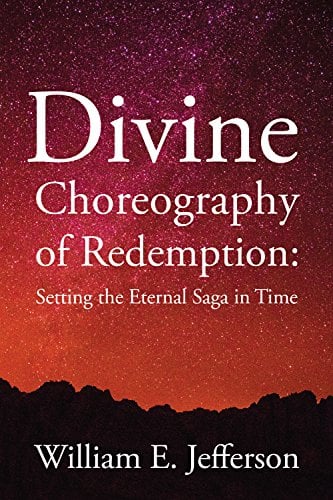
Divine Choreography of Redemption received a 4+ star review, making it an IndieReader Approved title.
Following find an interview with author Bill Jefferson.
What is the name of the book and when was it published?
Divine Choreography of Redemption: Setting the Eternal Saga in Time; Published November 1, 2018
What’s the book’s first line?
“Beyond the Storied Sea, where mariners and pilgrims long to sail, lies the ancient Isle of Estillyen. Though equally far from everywhere, those who wish to explore the isle shall find it mystically near.”
What’s the book about? Give us the “pitch”.
The novel explores the story of redemption as divine drama advanced by acts and agents that transcend time and space. Set on the ancient Isle of Estillyen, a troupe of Message Makers from the seventeenth century mysteriously arrives to extol the efficacy of redemption in today’s high-tech world.
At the heart of the novel a battle brews between reality, aided by algorithms and digital technology, and life nurtured by Scripture’s abiding narrative.
What inspired you to write the book? A particular person? An event?
No, not a person, nor a particular event, but a passion to draw out the creative themes that tend to press upon my mind.
What’s the main reason someone should really read this book?
The novel leads one on a journey of incarnational faith that melts away the veneer of mediated reality.
Further, the work is literature. One might say—a creative, compelling read, both mystically fashioned yet exceedingly relevant to the here-and-now.
What’s the most distinctive thing about the main character? Who-real or fictional-would you say the character reminds you of?
The main character is a monk named Narrative. A contemporary he does not have. His kind is found among the saints of olden days, like, Anselm of Canterbury.
If they made your book into a movie, who would you like to see play the main character(s)?
I would be presumptions for me to say what manner of man would play Narrative. He would need to burst upon the screen, say, like Tom Hulce did in playing the role of Wolfgang Amadeus Mozart, in the movie Amadeus.
When did you first decide to become an author?
Long before I did. The reality finally ceased me in 2010. I recall hearing myself tell someone: “I’ve decided to write”.
Is this the first book you’ve written?
No. Messages from Estillyen was the first, published in 2014.
What do you do for work when you’re not writing?
I own the Storybook Barn, an all occasion event venue in the Missouri Ozarks. But writing is my all, the work I shall do till my work is no more.
How much time do you generally spend on your writing?
I’ll start a new title the fall, and, when I do, the better part of each day will be consumed. This will carry on for months, six, nine, or more.
What’s the best and the hardest part of being an indie?
Perception. Not mine, but the general perception arising from the publishing world concerning a literary figure unknown.
What’s a great piece of advice that you can share with fellow indie authors?
Never compromise creative content. Let your manuscript be tweaked, tidied up, but nothing more. Also, aim to write literature that will stand the test of time.
Would you go traditional if a publisher came calling? If so, why?
Yes, but not a Christian publisher. I do not write Christian fiction. I write literature for a global audience.
Is there something in particular that motivates you (fame? fortune? more sex?)
No. It’s all about passion, calling and sense of mission.
Which writer, living or dead, do you most admire?
Perhaps Leo Tolstoy, along with Victor Hugo and Fyodor Dostoevsky.
Which book do you wish you could have written?
Strange question, in a way. I do not aspire to write someone else’s work. If I did, it would not be mine. To write like Tolstoy in War and Peace, or Victor Hugo in Les Misérables, this is the aim.
